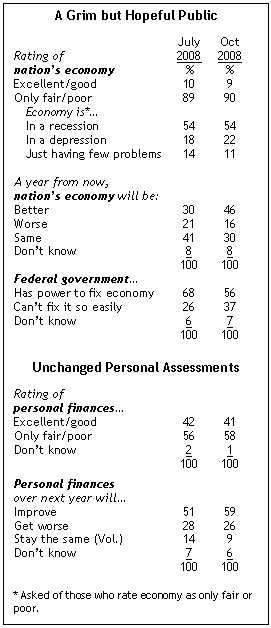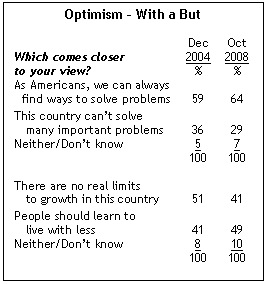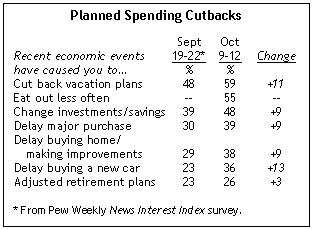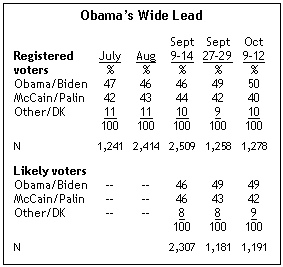Overview
 Americans are concerned about the nation’s economic problems almost to the exclusion of every other issue, and they register the lowest level of national satisfaction ever measured in a Pew Research Center survey. Just 11% say they are satisfied with the way things are going in the country – down 14 points in the past month alone.
Americans are concerned about the nation’s economic problems almost to the exclusion of every other issue, and they register the lowest level of national satisfaction ever measured in a Pew Research Center survey. Just 11% say they are satisfied with the way things are going in the country – down 14 points in the past month alone.
However, there is little indication that the nation’s financial crisis has triggered public panic or despair. Most Americans express confidence that the government still possesses the power to fix the economy, though that belief has lost adherents since July. There has been no decline in people’s perceptions of their own financial situations. Looking ahead to next year, Americans are more confident than they were in July about an improvement in the national economy and in their own personal finances.
This is not to say that the public has been spared the effects of the financial crisis: over the past three weeks, there have been sharp increases in the percentages saying they plan to rein in spending in a number of areas. Moreover, for the first time in a Pew survey, more Americans say that “people should learn to live with less,” rather than that “there are no limits to growth in this country.”
The latest national survey by the Pew Research Center for the People & the Press, conducted Oct. 9-12 among 1,485 adults reached on landlines and cell phones, finds that an increasing number say that jobs are difficult to find locally, and views of local real estate values remain negative. In addition, fewer people than in February say that their employer is in excellent financial shape. But these perceptions notwithstanding, there are no signs that the crisis has eroded people’s fundamental confidence in either their own personal financial outlook or the nation’s. As in July, a solid majority of Americans (54%) says the economy is in a recession, and the percentage saying the nation is in depression has not grown significantly (22%). Compared with this summer, more Americans think that economic conditions will improve next year (46% vs. 30%).
Continued optimism about the economy may well reflect the fact that while polls have shown that the president and Congress receive low grades for dealing with the financial crisis, most Americans continue to say that the federal government still has the power to fix the economy. A 56% majority of the public expresses this view, though that is considerably less than the percentage saying this in July (68%).
Perhaps more important, the public’s personal financial ratings are no lower than they were in mid-summer; 41% rate their finances as excellent or good, which is virtually unchanged since July (42%). Notably, 59% say they expect their financial situation to improve over the next year, up from 51% in July. Declining energy prices may be playing some part in the public’s resilience in the face of the financial crisis. The proportion citing fuel or gas prices as the top economic problem facing the country has fallen steeply, from 38% in July to 10% currently.
 Overall, fewer people now say that their incomes are falling behind the cost of living (57% vs. 64% in July). However, while inflation concerns have eased somewhat, nearly four-in-ten (38%) say that rising prices is the economic issue that worries them most; by comparison, 31% cite problems in the financial markets. Among those who describe themselves as working class or struggling financially, far more say their biggest economic worry is rising prices rather than problems in the financial markets. By contrast, those who describe themselves as professional or business class are far more likely to cite problems in financial markets than rising prices.
Overall, fewer people now say that their incomes are falling behind the cost of living (57% vs. 64% in July). However, while inflation concerns have eased somewhat, nearly four-in-ten (38%) say that rising prices is the economic issue that worries them most; by comparison, 31% cite problems in the financial markets. Among those who describe themselves as working class or struggling financially, far more say their biggest economic worry is rising prices rather than problems in the financial markets. By contrast, those who describe themselves as professional or business class are far more likely to cite problems in financial markets than rising prices.
The new poll finds no evidence that fundamental American optimism has eroded in the face of the financial crisis. Even after a week of some of the largest stock market declines since the Great Depression, 64% of the public say that “As Americans, we can always find ways to solve our problems and get what we want.” That is up from 59% since December 2004, shortly after the last presidential election.
Yet the survey does show a shift in basic public values regarding the limits of growth. A 49% plurality now says that “people in this country should learn to live with less” – the highest percentage expressing this sentiment since the question was first asked in 1994. 
In this regard, Americans clearly signal they intend to scale back their own spending. Nearly six-in-ten (59%) say they have delayed or cancelled vacation spending while 55% say they have been eating out at restaurants less often. Roughly half (48%) say they are changing the way their money is saved or invested, while substantial minorities are either delaying or shelving plans to make major household purchases (39%) or to buy a new car (36%). The percentages saying they are reining in spending have risen sharply in the past three weeks.
Views on Regulation of Business Unchanged
 As Americans’ fundamental optimism remains unabated by the financial crisis, basic views about the role of government have shown only modest changes. The public continues to be divided about the efficacy of government regulation of business. Currently, 50% believe such regulation is necessary to protect the public interest, while 38% think government regulation of business does more harm than good. The balance of opinion is largely unchanged since December 2004 (49% vs. 41%).
As Americans’ fundamental optimism remains unabated by the financial crisis, basic views about the role of government have shown only modest changes. The public continues to be divided about the efficacy of government regulation of business. Currently, 50% believe such regulation is necessary to protect the public interest, while 38% think government regulation of business does more harm than good. The balance of opinion is largely unchanged since December 2004 (49% vs. 41%).
Overall views of government are more negative they have been since the late 1990s. Nearly six-in-ten (57%) say that “government is almost always inefficient and wasteful” – up 10 points since December 2004. And somewhat fewer Americans say “the government should do more to help needy Americans even if it means going deeper into debt” than did so in 2004 (51% now, 57% then).
Views of business also have become more negative. Roughly eight-in-ten (78%) believe that “too much power is concentrated in the hands of a few large companies,” which is largely unchanged from past years; but a greater percentage strongly express this sentiment (70%) than at any point since the question was first asked in 1994. In addition, there has been a modest increase in the percentage saying “business corporations make too much profit” – from 53% in December 2004 to 59% currently.
Debtors and Banks Blamed for Crisis
 There is a broad public consensus regarding the causes of the current problems with financial institutions and markets: 79% say people taking on too much debt has contributed a lot to the crisis, while 72% say the same about banks making risky loans. Far fewer say weak governmental regulation of financial institutions (46%) or other factors have contributed a lot to the recent problems.
There is a broad public consensus regarding the causes of the current problems with financial institutions and markets: 79% say people taking on too much debt has contributed a lot to the crisis, while 72% say the same about banks making risky loans. Far fewer say weak governmental regulation of financial institutions (46%) or other factors have contributed a lot to the recent problems.
There are substantial partisan differences in opinions about the causes of the crisis. Far more Democrats than Republicans say weak government regulation is a major contributing factor (56% vs. 38%); 45% of independents express this sentiment. By contrast, fully 91% of Republicans place a lot of blame on people taking on too much debt, compared with 80% of independents and 74% of Democrats.
Crisis Favors Obama
 With few Americans expressing a positive view of national conditions
With few Americans expressing a positive view of national conditions
and President Bush’s approval rating reaching a new low (25%) in a Pew survey, the political environment favors the Democrats. Barack Obama holds a sizable 50% to 40% lead over John McCain, and a greater share of his supporters back him strongly. Moreover, the percentage of voters saying they have definitely decided not to vote for McCain has risen steadily, from 37% in early August to 45% in the current survey.
Voters continue to express more confidence in Obama than in McCain to handle the financial crisis; 47% say Obama could best address the current problems while 33% choose McCain. Voters are especially critical of McCain’s performance in explaining how he would handle the crisis. Just 29% say he has done an excellent or good job in explaining  his approach to the crisis while 67% say he has done only a fair or poor job.
his approach to the crisis while 67% say he has done only a fair or poor job.
Obama’s ratings for explaining how he would handle the crisis are much better than McCain’s. Still, fewer than half (48%) say Obama has done an excellent or good job in this regard, while about as many (47%) say he has done only fair or poor.


